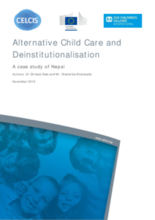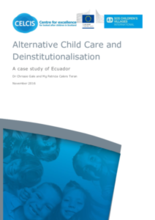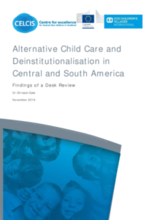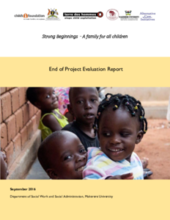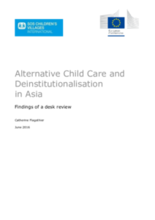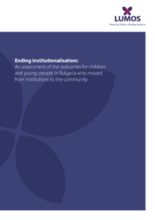Displaying 321 - 330 of 691
The report investigates why children are placed into alternative care, what types of alternative care are available in Nepal, what structures and processes govern alternative care, how the alternative care workforce are trained and supported, and what is and is not working in Nepal's current system. It concludes with recommendations for enhancing alternative care in the country.
The European Commission Directorate-General for International Cooperation and Development (DG DEVCO) commissioned SOS Children’s Villages International to undertake case studies of arrangements for ‘alternative child care’ in six non-European countries across three continents to help inform the EU’s future strategy for provision of support for children in countries outside Europe. This report is a case study of one of the six countries, Ecuador.
The overall purpose of this study is to present an ‘introduction’ to alternative care systems in Central and South America (CSA).
The current study makes analyses of the national strategy for deinstitutionalization of children and concludes on important recommendations concerning national policy development.
This study examined whether interventions in Russian Baby Homes promoting warm, sensitive, and responsive caregiver-child interactions and relationships would be associated with advantages in those children’s behavior years after they transitioned to family care.
Strong Beginnings (SB) was an 18-month project purposed to promote an alternative care model that places emphasis on family based care of children, improving the quality of care within child care institutions, build capacities of government and non-government agencies in implementing alternative care; generate evidence and promote learning.
This news article from the BBC is about a small orphan village south of Moscow, which has been experimenting with what the founders think may be a novel solution to support both foster children and the families who take them in.
This desk review examines the reasons children are being placed in care, evaluates the types of care in the region, and discusses regional efforts towards deinstitutionalisation.
This report shares outcomes to date for a group of 1,292 children and young people with disabilities who have transitioned out of large residential institutions (institutions) into small group homes (SGHs) in the community.
This country care review includes the care-related Concluding Observations adopted by the Committee on the Rights of the Child and the Committee on the Rights of Persons with Disabilities.

